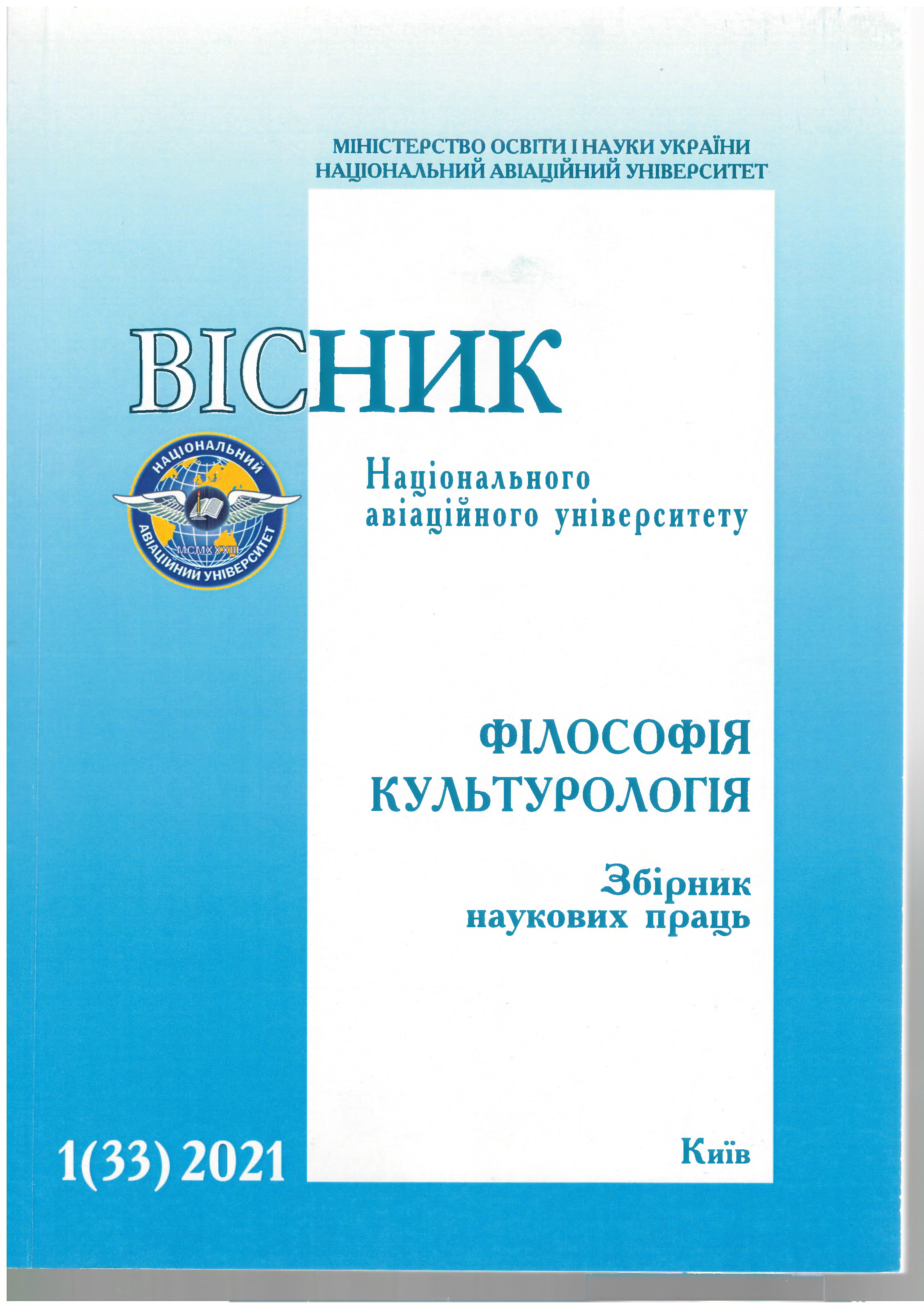SOCIO-ANTHROPOLOGICAL COLLISIONS OF MODERN HUMAN EXISTENCE AS A METHODOLOGICAL PROBLEM
DOI:
https://doi.org/10.18372/2412-2157.33.15630Keywords:
man, society, anthropocentrism, social anthropology, cultural anthropology, social cognition, universality of human existenceAbstract
Introduction. The “capture” of the public life of the entire world community by COVID-19 for the second year requires not only a colossal concentration of material, financial and health resources of the humanity, but also comprehension of the new reality of human existence in the world. Philosophy is impossible without the anthropological aspect, which determines the historical and the geographical significance of the world development by man and the most acute problems of the present social life, thanks to the production of modern socio-anthropological knowledge, its integration into educational and industrial practice, a birth of the new quality of the formation of a worldwide knowledge economy, therefore the relevance of the chosen problem is undeniable. The aim of our paper is the socio-anthropological dimension of the universality of human existence base don there cognition of universal values in the global coordinate system of today. Research methodology was determined by the materials of the historical-sociological, philosophical-anthropological and socio-philosophical directions, and we recognized the cultural-historical, structural-functional, comparative and typological methods as basic. Research results. One of the main socio-anthropological collisions is still the philosophical problem of the universality of human existence and the "one-dimensionality" of an individual. The idea of human universality causes the emergence of the integrated knowledge manifested in the archetype of the Microcosm. Generic human universality is acquired in the system of modern civilization due to a kind of "technicalization" of the human individual existence. Since the nature of the human race manifested in the contradictions of generic universality and one-sidedness of human life is not identical, there is always the eternal question of its future existence, because the past is a world of realized and lost opportunities and perspective is always an unknown world, despite modern forecasting techniques in various areas of human activity. If the biological necessity of human existence is innate and cannot be fundamentally changed, then social necessity is mastered by man in his life and has its own characteristics. In particular, a social necessity arises the very given world and an aspect of human ancestral existence, which can be joined only through the development of forms of national and world culture through language, learning the meanings of life symbols, activities, etc. Social necessity is not a "superstructure" over the biological aspect of human ancestral existence, it is its organic component, which provides harmony in the need to communicate and unite people in communities. Discussion. The modern anthropological perspective is less formalistic and can use the materials of social anthropology, which presents meaningful models and mechanisms of social behavior, to find common ground between the originally social and modern multivariate forms of social organization. Socio-anthropological principles of creative human existence are widely represented in Ukrainian philosophical thought. Reproduction of peculiar semantic layers of subject-activity worldview, among which the main one is the project of creating one's own life in the world, including all the versatility of dimensions of human existence could be found in the works by V. Bychko, L. Drotianko, V. Tabachkovsky, N. Khamitov, G. Kovadlo, E. Andros and many other researchers. Conclusion. We can identify three methodological directions of the modern specificity of the socio-anthropological dimension of cognition – a systematic approach, structuralism, and structural-functional analysis. We can note that social anthropology focuses on socio-biological, universal, cultural-anthropological and personal qualities of man, taken in its historical and social fluidity and worldview system of archetypes. The most adequate way of human socio-cultural existence in Ukraine can be carried out only on the basis of archetypes of life and world order developed over thousands of years on its territory, which theoretical and practical carrier in modern conditions is social philosophy and anthropology.
References
Radcliff-Brown A.R. Method in social anthropology. London, 1958. P. XVI.
Rivers W.H.R. Kinship and Social Organization. — L.: Athlone press; N.Y.: Humanities press, 1968.
Аверкиев Ю. П. История теоретической мысли в американской этнографии. М., 1979. 382 с.
Дротянко Л. Г., Ягодзінський С. М. Міжкультурна комунікація і толерантність перед лицем глобальних загроз / Дротянко Л. Г., Ягодзінський С. М. // Вісник національного авіаційного університету. Серія: Філософія. Культурологія: Збірник наукових праць. - Вип. 1(31). – К.: НАУ, 2020. – С. 15-21.
Кант И. Антропология с прагматической точки зрения. СПб.: Наука, 1999. – 471 с.
Клешня Г. М. Нові пріоритети сталого розвитку в умовах пандемії COVID-19: соціально-філософський аспект / Г. М. Клешня // Вісник національного авіаційного університету. Серія: Філософія. Культурологія: Збірник наукових праць. – Вип. 2(32). – К.: НАУ, 2020. – С. 35-39.
Колізії антропологічного розмислу / (В.Г. Табачковський, Г.І. Шалашенко, А.М. Дондюк, Н.В. Хамітов, Г.П. Ковадло, Є.І. Андрос). – К.: Видавець ПАРАПАН, 2002. – 156 с.
Маркс К., Енгельс Ф. Німецька ідеологія // Твори. К.: Політвидав України, 1967. Т. 3. 502 с.
Сепир Э. Антропология и социология // Сепир Э. Избранные труды по языкознанию и культурологии. М., 1993. С. 611–629.
Фрэзер Дж. Золотая ветвь. Исследования магии и религии. М.: ООО «Фирма «Издательство АСТ», 1998. 784 с.

